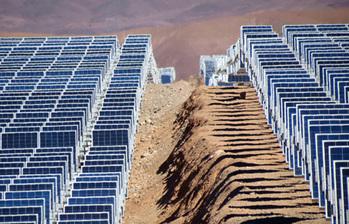Context
As a result of strong economic growth and the development of large-scale projects, particularly in the mining sector, Chile's demand for energy is increasing at an annual rate of around six per cent. The country has few fossil energy resources, so it currently imports more than 70 per cent of its primary energy. Despite this, Chile has great potential for exploiting numerous renewable energy forms, including micro-hydropower, wind and solar energy, biomass, geothermal and tidal power. Thanks to the high levels of solar radiation, especially in the north of the country, conditions are exceptionally good for using various solar-driven technologies to generate power and heat. Interest in these technologies is buoyed by the current decline in their cost.
German companies play a leading role in the increasingly competitive market for solar technologies. Chile is especially attractive to them because it is well developed, economically and politically stable with a high level of industrialisation and strong economic growth.
Objective
Concentrated solar and photovoltaic technologies on a commercial scale are recognised as options for energy generation in Chile, and they are being expanded and more widely promoted. This is improving the security of the power supply, while contributing significantly to the reduction of greenhouse gas emissions.
Approach
The project is developing the technical capacity of local actors and contributing to more enabling environment. It promotes the market introduction and grid connection of solar facilities, as well as the application of solar technologies for industrial processes. If entrepreneurs and the relevant politicians are more familiar with solar technologies, such as concentrated solar power/concentrated solar thermal (CSP/SST) and photovoltaics, and if they integrate those energy sources into the electricity grid, they will provide Chile with a long-term option to diversify its energy mix..
The project has commissioned various studies. One of these identified obstacles to the introduction of new technologies to the market, another gauged the demand for energy in the mining sector and industry, and a third determined possible locations for the use of renewables. The findings show, for instance, that it would make sense to use solar energy to power desalination plants or hydraulic pumps in the mining sector and heavy industry.
The project brings various expert groups into contact with each other in discussion forums on renewable energies. This encourages the emergence of new networks through which the actors can exchange ideas and know how. It also gives technical advice to the operators of Chile's integrated energy grids on the inclusion of CSP/CST.
To ensure that the facilities can be operated and maintained on a sustainable basis, with support from the project the University of Antofagasta is establishing a training centre specifically for CSP and photovoltaic field plants. This should become a reference centre for solar energy technology in Latin America. The project promotes cooperation as well as scientific and technical exchanges between German and Chilean research institutes and universities.

